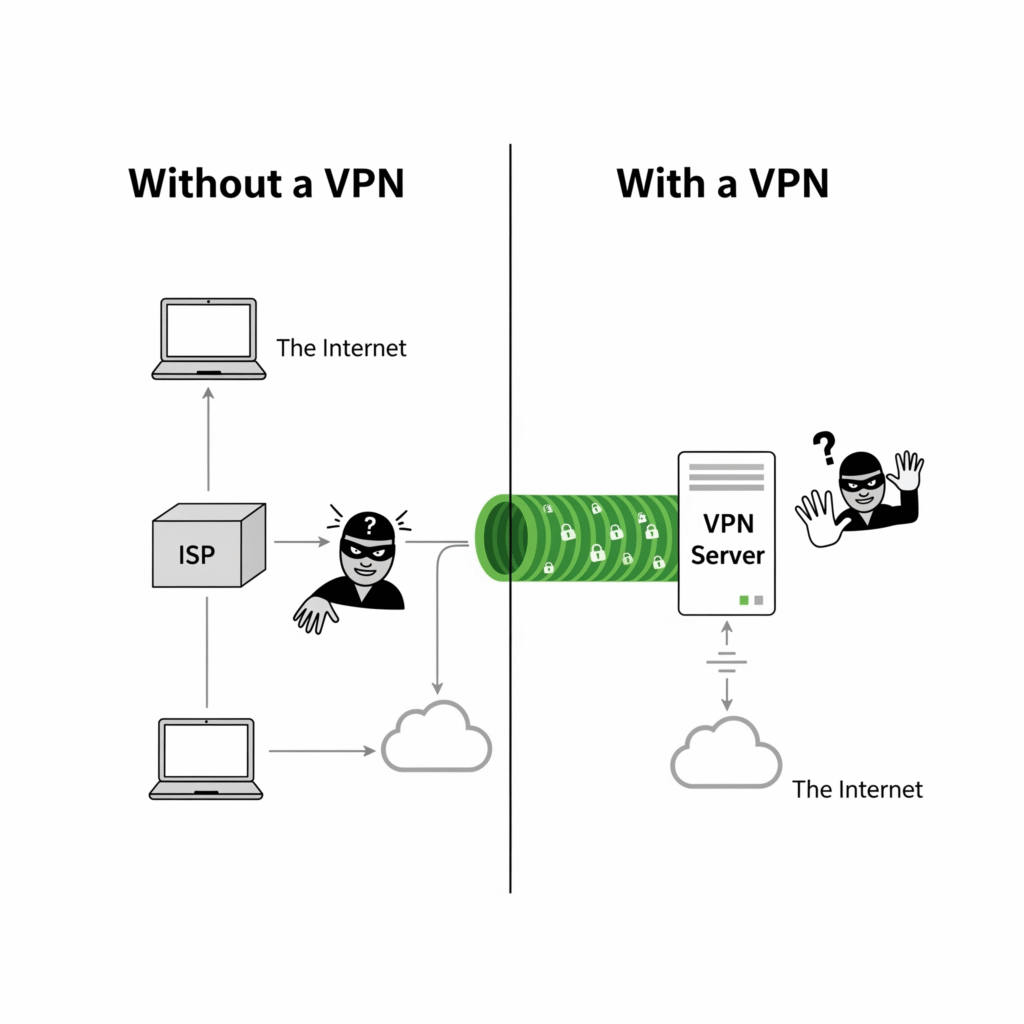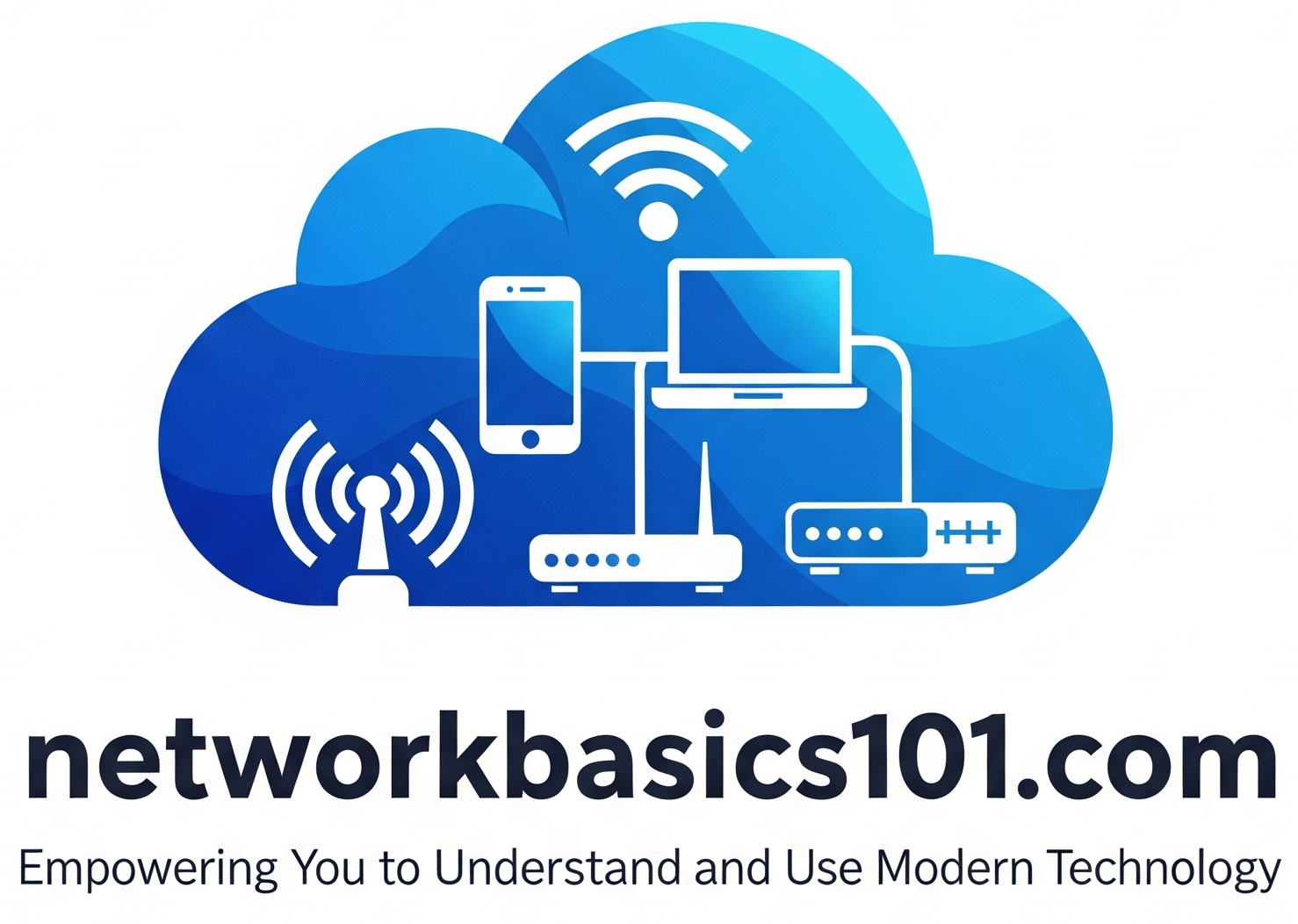Ever feel like your internet activity is being watched? From your browsing history to your location, a lot of your online data is visible as it travels across the internet. This is where a Virtual Private Network (VPN) comes in. Think of a VPN as creating a secure, private tunnel for your internet traffic, protecting your data and enhancing your online privacy.
Your Data’s Journey (Without a VPN)
Normally, when you connect to the internet, your device sends your requests (like visiting a website) through your Internet Service Provider (ISP). Your ISP can see your internet activity, and your data travels across various networks to reach its destination.

How a VPN Creates a Private Tunnel
When you use a VPN, your internet traffic goes through an encrypted tunnel to a VPN server in a location of your choice.
Here’s what happens:
- Your Connection is Encrypted: The VPN app on your device encrypts all your internet traffic, turning it into unreadable code.
- Traffic Travels to the VPN Server: Your encrypted data travels to the VPN server through a secure connection.
- Your IP Address is Masked: The VPN server acts as an intermediary. When your request reaches the website or service you’re trying to access, it appears to come from the VPN server’s IP address, masking your real IP address and location.
- Data is Decrypted (for the Destination) and Sent Back: The website sends the requested information back to the VPN server, which decrypts it and sends it back to your device through the secure tunnel.
Analogy: Imagine you’re sending a letter. Without a VPN, the post office (your ISP) can read the return address and potentially see the contents. With a VPN, you put your letter in a sealed, unmarked package and send it to a special forwarding service (the VPN server) in a different city. The forwarding service then sends the package to its final destination with their address as the return address, keeping your real identity and the contents private.
Why Use a VPN?
- Enhanced Privacy: Prevents your ISP and others from tracking your online activities.
- Increased Security on Public Wi-Fi: Protects your data from potential eavesdroppers on unsecured networks.
- Access Geo-Restricted Content: Allows you to access content that might be blocked in your current location by connecting to a server in a different country.
- Bypass Censorship: In some regions, VPNs can help bypass internet censorship.
Trusted VPN Providers (with General Pricing)
Choosing a reputable VPN provider is crucial. Look for providers with strong encryption, a clear no-logs policy (meaning they don’t store your activity), and a wide network of servers.
Here are a few well-regarded VPN providers (please note that pricing can change, so it’s best to check their official websites for the most up-to-date information):
- NordVPN: Known for its speed, security features, and large server network. Offers various plans, typically starting around $10-13 per month or $50-80 for a longer-term subscription.
- Surfshark: A budget-friendly option that allows unlimited simultaneous connections. Prices usually start around $12-15 per month or $40-60 for longer subscriptions.
- ExpressVPN: Praised for its user-friendliness, speed, and strong privacy features. Generally a bit more expensive, with monthly plans around $13 and longer-term plans around $80-100.
- ProtonVPN: Developed by the creators of ProtonMail, focusing on security and privacy. Offers free and paid plans, with paid plans starting around $5-10 per month for basic features and more for advanced options.
- CyberGhost: Has a large server network and user-friendly apps. Prices often start around $11-13 per month or $40-60 for longer subscriptions.
Important Considerations When Choosing a VPN:
- No-Logs Policy: Ensure the provider has a strict no-logs policy.
- Server Locations: Check if they have servers in the locations you need.
- Speed and Reliability: Read reviews to get an idea of their performance.
- Number of Simultaneous Connections: Consider how many devices you need to protect.
- Ease of Use: Look for apps that are user-friendly on all your devices.
In Simple Terms:
A VPN creates a secure and private connection for your internet traffic, shielding your online activity from prying eyes and enhancing your privacy and security, especially when using public Wi-Fi. Choosing a trusted provider is key to ensuring your data is in safe hands.
